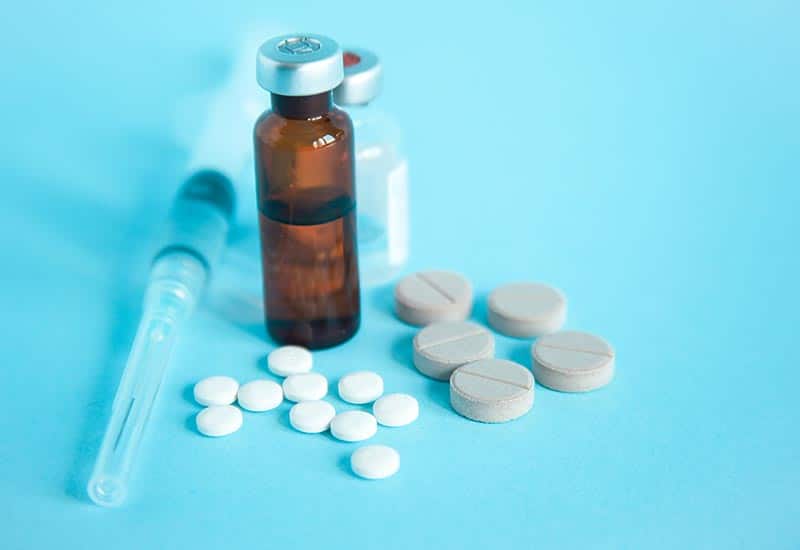Substances
How Long Does Promethazine Stay in Your System?
Medically Reviewed By
Written By
Last medically reviewed August 4, 2025
Substances
Medically Reviewed By
Written By
Last medically reviewed August 4, 2025
Promethazine offers much-needed relief for allergy sufferers, those with motion sickness, and people experiencing cold symptoms.[1] While it provides relief, there are several side effects that users of promethazine might encounter. This could lead them to wonder how long the symptoms will last or when the medication will leave their system.
In this blog, you’ll learn how promethazine works, how long it stays in the system, and what factors affect its elimination half-life.
Promethazine is a legal prescription medication commonly used to treat allergy symptoms, motion sickness, and nausea.[2] However, it has also gained notoriety as an ingredient in drug-fueled crimes and overdoses. Often referred to as ‘purple drink,’ promethazine is frequently mixed with other central nervous system depressants such as alcohol and fentanyl to achieve a high.[3]
According to Drugs.com, this medication works by changing actions of certain chemicals in the brain.[2] As an antihistamine, it also blocks the effects, of naturally occurring histamine, reducing hives and itching. It is administered as an injectable solution, tablet, syrup, or rectal depository.
Promethazine has an elimination half-life of 12 to 15 hours.[4] According to StatPearls, it takes approximately 4 to 5 half-lives for a drug to be fully eliminated from the body.[5] Therefore, it may take up to 75 hours for promethazine to be completely eliminated, though there are factors that can change its half-life.
Although promethazine has a elimination half-life of 12 to 15 hours, there are a number of factors which can change its half-life.
These include:[6]
If someone has taken a toxic amount of promethazine, they may receive intravenous fluids, undergo gastric lavage, and be administered activated charcoal to reduce the drug’s presence in their system.[1] These measures can help manipulate the drug’s elimination half-life to ensure the patient’s safety.
Signs of promethazine toxicity include rapid heartbeat (tachycardia), CNS, depression, respiratory depression, and delirium.[1]

Withdrawal from promethazine can be more common in individuals using it alongside opioids like codeine. Codeine is a powerful opioid recognized for its genuine medical purposes, but it’s also classified as a Schedule V controlled substance due to its potential for misuse and dependency.[7]
If someone has been using promethazine with codeine inappropriately, they might develop a reliance on it and experience withdrawal symptoms when they try to stop.[7] Typically, with codeine, these symptoms can begin as soon as 6 to 12 hours after the last dose, often peaking around two days later and then slowly diminishing over time.[8]
To ensure a smoother transition, individuals using this formulation will work closely with their healthcare provider to create a personalized tapering plan that gradually decreases their dose.
Currently, there is limited information about how long it takes to recover from promethazine toxicity. Because there are different formulations of promethazine, each case requires a unique treatment approach, making recovery a highly individualized process. Rapid treatment in a hospital setting is essential for the best outcomes. Anecdotal reports suggest that individuals with uncomplicated cases of promethazine toxicity usually have relatively short hospital stays.[1]
Purple drink has become popular in songs and music videos, sadly leading to an increase in substance use disorders and fatal overdoses. However, knowing these risks might not make it any easier to stop using once addiction takes hold.
If you’ve tried to stop using promethazine but find it hard to stay abstinent or spend most of your time recovering from its effects, you might have an addiction. Luckily, we can help you heal and remain sober.
Contact Southeast Addiction Center GA to learn about our addiction treatment programs and holistic approach to care. Together, we can move forward and achieve your goals.
Promethazine is a prescription medication belonging to the antihistamine and antiemetic drug classes. It is used to treat allergies, motion sickness, vomiting, and pain after surgery.
Promethazine is not an addictive medication, though it is often mixed with addictive substances to enhance their effects.
It isn’t designed to be a party drug, but it is used illegally and illicitly to produce a euphoric high. In this setting, it is known as ‘purple drink’ or ‘green drin.’.
The elimination half-life of promethazine is 12 to 15 hours.
No, promethazine is available as a prescription drug only.
If you have an addiction to promethazine, you will need treatment to overcome cravings and the urge to relapse. This is typically administered at a substance abuse treatment center, where you will receive medical detox and behavioral therapy. When combined, this treatment approach is called medication-assisted treatment (MAT).
No, it is not a cold medicine, though some doctors may prescribe it for off-label uses.
[1] Stat Pearls. (2024 Jan 1). Promethazine. Retrieved from https://www.ncbi.nlm.nih.gov/books/NBK544361/ on 2025 Jul 4.
[2] Drugs.com. (2024 Feb 29). Promethazine. Retrieved from https://www.drugs.com/promethazine.html on 2025 Jul 4.
[3] U.S. FDA. (2024 Jan 12). Pharmacist Sentenced for Illegally Dispensing Promethazine Cough Syrup and Earning Millions in Profits. Retrieved from https://www.fda.gov/inspections-compliance-enforcement-and-criminal-investigations/doj-press-releases-involving-fda-oci/pharmacist-sentenced-illegally-dispensing-promethazine-cough-syrup-and-earning-millions-profits on 2025 Jul 4.
[4] Drug Bank. (n.d.). Promethazine. Retrieved from https://go.drugbank.com/drugs/DB01069 on 2025 Jul 5.
[5] StatPearls. (2025 May 3). Elimination Half-Life of Drugs. Retrieved from https://www.ncbi.nlm.nih.gov/books/NBK554498/ on 3035 Jul 5.
[6] Drugs.com (2024 Oct 17). How Long Does Promethazine Stay in the System? Retrieved from https://www.drugs.com/medical-answers/how-long-does-promethazine-stay-in-your-system-364597/ on 2025 Jul 5.
[7] U.S FDA. (n.d.). Promethazine HCI and Codiene Phosphate Oral Solution. Retrieved from https://www.accessdata.fda.gov/drugsatfda_docs/label/2008/008306s030lbl.pdf on 2025 Jul 5.
[8] Health Direct. (2023 Aug). Opioid Withdrawal Symptoms. Retrieved from https://www.healthdirect.gov.au/opioid-withdrawal-symptoms on m2025 Jul 5.






